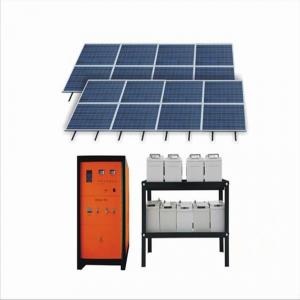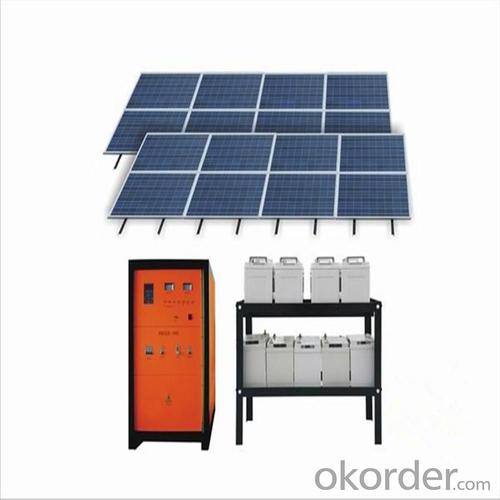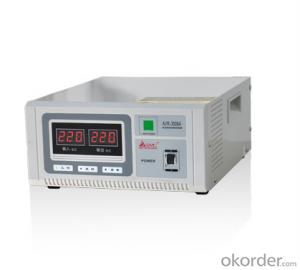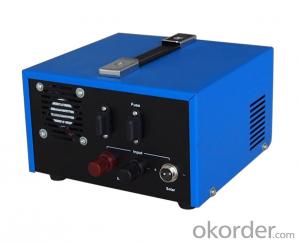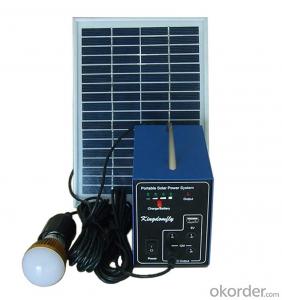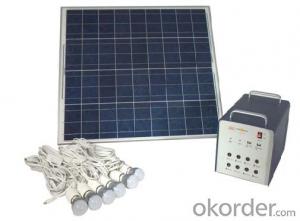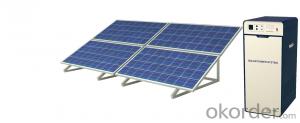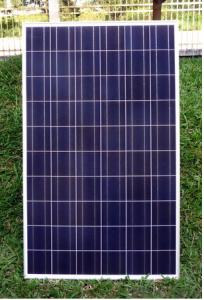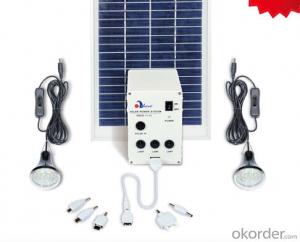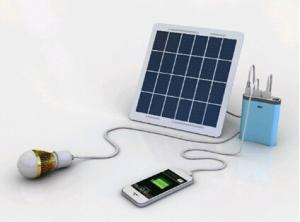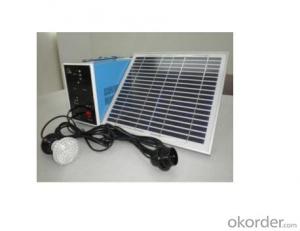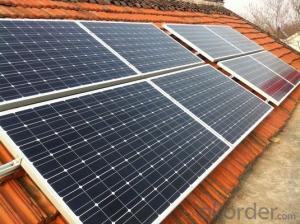Solar Energy Systems Workington - CNBM 150W High Quality Solar Home System
- Loading Port:
- China Main Port
- Payment Terms:
- TT or LC
- Min Order Qty:
- 500 Sets set
- Supply Capability:
- 200000 Sets per year set/month
OKorder Service Pledge
OKorder Financial Service
You Might Also Like
Details Of CNBM 150W Solar Home System High Quality
Item | EW-SHS150W | ||||||
Solar module | Type | Polycrystalline Silicon | |||||
Item/Qty. | SPS075 -12M / 2pcs | ||||||
Maximum power at STC(Pm) | 75 Wp | ||||||
Optimum operating current(Imp) | 21.6V | ||||||
Short circuit current(Imp) | 4.87A | ||||||
Dimensions l×w×h/Weight | 1195mm × 541mm × 28mm / 8kg | ||||||
Battery | Type | Lead-acid Maintenance-free Rechargeable | |||||
System Voltage | 24V | ||||||
Capacity | 100AH/12V, 2pcs | ||||||
Dimensions l×w×h/Weight | 329mm × 172mm × 229mm / 31kg | ||||||
Charge Controller | System Voltage | 24V | |||||
Max. module input short circuit current | 6A | ||||||
Dimensions l×w×h/Weight | 130mm × 88mm × 39mm / 0.165kg | ||||||
Inverter | Type | High frequency pure sine wave | |||||
Item/Qty. | SK300-224 | ||||||
Continuous Output Power | 300W | ||||||
Surge Rating | 600W | ||||||
Output Voltage | 220V / 50Hz | ||||||
Protection | Overload, Short circuit, Reverse polarity(FUSE) , Over/under input voltage, Over temperature. | ||||||
Dimensions l×w×h/Weight | 224mm × 164mm × 78mm / 1.8kg | ||||||
Control Box | Material | Steel box of zinc-plated and lacquer-coated | |||||
Color | Gray | ||||||
Dimensions l×w×h/Weight | 560mm × 550mm × 600mm / 23kg | ||||||
Capacity of Load: | Load | specification | Load power | number | Working hours/day | Expend/day | |
Saving light | 11W | 1 | 6 | 66Wh | |||
Television | 21inch | 70W | 1 | 2 | 140Wh | ||
Television receiver | 25W | 1 | 4 | 100Wh | |||
Total | 106W | 306Wh | |||||
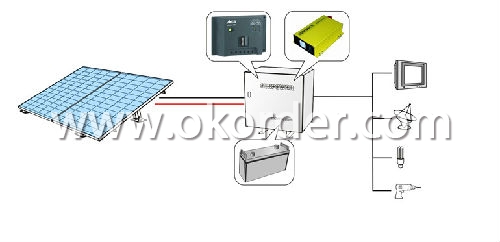
Packaging & Delivery Of CNBM 150W Solar Home System High Quality
Packaging & Delivery Of CNBM 150W Solar Home System High Quality | |
Packaging Detai | Packaging Detail:Export Carton and Pallet or under customer request. |
Delivery Detail:10-20days | |
Our advantages
•Professional products,brand power,group advantage.
•We can do OEM and ODM, and we have our own talented R&D teams
•All our products are easy to be used and convenient in maintanence
•Strong technical team is ready to work for you.
•Factory with 70000square meters,real factory price,top service.
- Q: Can solar energy systems be used for powering off-grid manufacturing facilities?
- Yes, solar energy systems can certainly be used to power off-grid manufacturing facilities. By installing solar panels on the facility's roof or nearby land, the sunlight can be harnessed and converted into electricity to meet the energy needs of the manufacturing processes. Additionally, by utilizing battery storage systems, excess energy generated during the day can be stored for use during periods when sunlight is unavailable. This enables off-grid manufacturing facilities to reduce their reliance on fossil fuels and reduce their carbon footprint while still maintaining efficient operations.
- Q: Can solar energy systems be installed on the ground?
- Yes, solar energy systems can be installed on the ground. Ground-mounted solar systems are a common and effective way to harness solar energy. They are installed on open land or in open spaces and can be scaled to accommodate various energy needs. Ground-mounted systems offer flexibility in terms of orientation and tilt angles, ensuring optimal sun exposure for maximum energy production.
- Q: How do solar energy systems impact social equity?
- Solar energy systems have the potential to significantly impact social equity in various ways. Firstly, they provide access to clean and affordable energy for communities that may not have reliable access to electricity, reducing energy poverty and improving quality of life. Additionally, solar energy can create job opportunities, particularly in communities that have been historically marginalized or economically disadvantaged. This can contribute to reducing income inequality and empowering local economies. Furthermore, solar energy systems allow for decentralized power generation, giving communities more control over their energy sources and reducing dependence on centralized utilities. Overall, solar energy systems have the potential to promote social equity by improving energy access, fostering economic empowerment, and increasing community resilience.
- Q: How does a PV system convert sunlight into electricity?
- A PV system, also known as a solar panel system, converts sunlight into electricity through the use of photovoltaic cells. These cells are made of semiconducting materials, typically silicon, which have the ability to convert sunlight directly into electricity. When sunlight hits the surface of the PV cells, it excites the electrons within the material, causing them to flow, creating an electric current. This current is then captured and harnessed by the system, allowing it to be used as electricity for various purposes.
- Q: How do solar energy systems impact the stability of the electrical grid?
- Solar energy systems can impact the stability of the electrical grid by adding variability to the power supply. The intermittent nature of solar energy, dependent on weather conditions and daylight availability, can result in fluctuations in power generation. However, with proper integration and grid management strategies, such as energy storage systems and smart grid technologies, these impacts can be minimized, and solar energy systems can contribute to a more stable and resilient electrical grid.
- Q: What is the role of solar energy systems in reducing heat island effect?
- Solar energy systems can help reduce the heat island effect by generating electricity from sunlight, which reduces the reliance on fossil fuels and consequently decreases the amount of heat and air pollution emitted into the environment. Additionally, solar panels can provide shade and help to cool urban areas by absorbing and reflecting sunlight, thereby mitigating the intensity of the heat island effect.
- Q: What is the role of a solar energy system installer?
- Solar energy system installers have a vital role in the transition to renewable energy sources. They are responsible for designing, installing, and maintaining solar energy systems in residential, commercial, and industrial buildings. Their main objective is to ensure that solar panels are installed correctly and functioning efficiently. To begin with, installers evaluate the site where the solar panels will be placed. They consider factors such as location, orientation, and shading to determine the best design and positioning of the panels. This involves conducting a comprehensive analysis of the site's solar potential and taking into account any potential obstacles that may affect the system's performance. Once the design is finalized, installers acquire the necessary equipment and materials for the installation. This includes solar panels, inverters, mounting systems, and electrical components. They also ensure compliance with local building codes and regulations. The installation process involves securely mounting the solar panels on rooftops or the ground. Installers then connect the panels to the building's electrical system and wire them to the inverters. A strong understanding of electrical systems is crucial to ensure a safe and efficient connection. After the installation, installers carry out thorough testing and commissioning to verify that the system is functioning correctly. This includes checking the electrical connections, monitoring system performance, and addressing any issues that may arise. In addition to installation, installers are responsible for providing maintenance and repair services. They regularly inspect the panels, clean them, and replace any damaged or faulty components to ensure optimal performance and durability. They may also assist with system upgrades or expansions as required. Overall, the role of a solar energy system installer is essential in promoting the adoption of renewable energy. They are responsible for the successful installation and maintenance of solar energy systems, enabling individuals and businesses to decrease their dependence on fossil fuels and contribute to a more sustainable future.
- Q: Can a solar energy system be installed on a warehouse or industrial facility?
- Yes, a solar energy system can be installed on a warehouse or industrial facility. In fact, these types of buildings are often ideal for solar installations due to their large roof spaces and ample sunlight exposure. Installing solar panels on a warehouse or industrial facility can help reduce energy costs, decrease reliance on grid electricity, and contribute to a more sustainable and environmentally friendly operation. Additionally, solar energy systems can provide a backup power source during grid outages, ensuring continuous operations in critical industrial processes. With the advancements in solar technology and the availability of various financing options, it has become increasingly feasible and cost-effective to install solar energy systems on warehouses and industrial facilities.
- Q: Can a solar energy system be installed on a public park or recreational area?
- Certainly, it is possible to install a solar energy system on a public park or recreational area. In truth, implementing solar panels in such locations can serve as an excellent means of promoting sustainability and renewable energy. Public parks and recreational areas frequently possess expansive, sunlit spaces, rendering them perfect sites for solar panel installation. These systems have the capability to produce clean, renewable energy and power numerous park facilities, including lighting, water fountains, and even charging stations for electric vehicles. Furthermore, the installation of solar panels in public parks can present a valuable educational opportunity for visitors to acquire knowledge about the advantages of solar energy and the significance of environmental preservation. Furthermore, these systems possess the potential to diminish the park's dependence on fossil fuels and diminish its carbon footprint, thus contributing to a more environmentally friendly and sustainable future.
- Q: Are solar energy systems expensive?
- Solar energy systems can be initially expensive to install, but they can save money in the long run by reducing electricity bills and providing a return on investment over time. Additionally, government incentives and falling solar panel prices have made solar energy systems more affordable and accessible to a wider range of consumers.
Send your message to us
Solar Energy Systems Workington - CNBM 150W High Quality Solar Home System
- Loading Port:
- China Main Port
- Payment Terms:
- TT or LC
- Min Order Qty:
- 500 Sets set
- Supply Capability:
- 200000 Sets per year set/month
OKorder Service Pledge
OKorder Financial Service
Similar products
Hot products
Hot Searches
Related keywords
